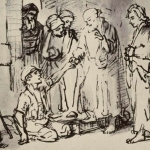Sermon / Maundy Thursday / March 24, 2016 / A Towel & A Basin / John 13 / Pastor Terry Defoe

13 Now before the festival of the Passover, Jesus knew that his hour had come to depart from this world and go to the Father. Having loved his own who were in the world, he loved them to the end. (N.R.S.V.)
We have come this evening to our Maundy Thursday worship service. Tonight, as you just heard, we focus on events recorded for us in the 13th chapter of John. I pray that the Holy Spirit would enlighten us as we consider this important part of God's Word tonight!
The 13th chapter of John, verse 1, includes these words:
Having loved his own who were in the world, he loved them to the end. (John 13:1, N.R.S.V.)
So begins the second half of John’s Gospel. Jesus' public teaching has been completed, and now Jesus prepares his disciples for what is to come. The statement “he loved them to the end” is loaded with meaning. The Greek word here can mean “end” in the sense of conclusion or termination, or in the sense of goal, aim, or fulfillment. In chapter 13, as I say, we come to the second half of John's gospel, and, for the next five chapters, all of us, not just Jesus' disciples, are prepared for Jesus' crucifixion, His resurrection, and His ascension to heaven.
Jesus knew that his hour of departure had come. John emphasizes that
Having loved his own who were in the world, he loved them to the end.
Jesus loved, not just His disciples, but the whole world, to the fullest extent, as much as he could (v.1). He loved, as we will see in a moment, despite betrayal and the power of darkness. His goal was to prepare His disciples to continue on without him after he died, was raised, and ascended into heaven. Jesus knows very well that the “hour” has come to depart from this world and to return to the Father (13:1). And He knows very well that the Father has given all things into his hands, and that he has come from God and is returning to God (13:3). Knowing all this, Jesus demonstrates his love for his disciples in a dramatic way by taking on the role of a slave and washing their feet. Jesus’ act of loving service recalls what Mary of Bethany had done just a few days earlier, anointing his feet with expensive perfume and drying them with her hair. At that point, Jesus interpreted her extravagant act of love and service as an anointing for his burial (12:1-7).
On this Maundy Thursday, two important traditions compete for our attention, each connected to a memorable line of Scripture. One begins,
While they were eating, Jesus took bread....
And the other says,
A new commandment I give you.
That first Maundy Thursday tradition is associated with the institution of the Lord's Supper. The second, the one we're looking at tonight, is connected to John's account of Jesus washing the disciples' feet. Tonight, our Lord Jesus brings us a commandment to act in a loving way, even when that's very hard to do. We Christians often fall short of God’s perfect love, and for that, we humbly approach our God in repentance and contrition. Tonight, we pray for God's enabling as we endeavor to be "servants of the Servant," for our good, and for His glory.
The name “Maundy” in Maundy Thursday comes from the first Latin word of John 13:34, mandatum, which means "commandment." Our Lord Jesus says:
I give you a new commandment, that you love one another. (N.R.S.V.)
Jesus’ command to love, tied to the example of the foot washing, lies at the heart of this special day. Maundy Thursday, otherwise known as Holy Thursday, holds a mandatum for Christians, a commandment to serve others in His name. What we have from Jesus tonight is a call to serve one another, as well as the world outside these walls, in His name. That service is gracious and loving, it's compassionate and respectful. And it reflects well on the Lord we serve, and the church we call home. For our Lord Jesus, and this is a theme that John emphasizes, this service brings God's light to the world. This loving service shows the world what it means to be a Christian. Our text from John 13 tonight, in a very real sense, is a glowing candle in the darkness. It is, as one writer says,
... a command to love one another amid the realities of violence and betrayal as a continuation of Jesus' ministry in the world.
It's important to recognize that Jesus' command to love is made in the context of betrayal and denial -- betrayal and denial, not from outsiders, but from His own followers. Jesus had just washed the feet of 12 men, one of whom would betray him. Another, Peter, would publicly deny even knowing Him. And the rest of them would abandon him and run for their lives when the crucial moment came. Jesus knew all of this and, still, he demonstrated his love for each and every one of them by washing their feet.
John's description of the footwashing is followed by the prediction of Judas' betrayal, and the new commandment is followed by Jesus' prediction of Peter's denial. The Evil One is present and active here, putting betrayal into the heart of Judas Iscariot (13:2). Yet Jesus' love doesn't waver. He refuses to meet evil on Satan's terms, but does so on God's terms. In the face of betrayal, he washes the feet of all His disciples, including Judas. Jesus loves in the face of sin and evil. When Jesus washed his disciples’ feet, Judas was there. Jesus will soon demonstrate just how much God loves the world by dying for those who manifestly do not love him. Jesus' love is tough love. It's self-sacrificing love. It puts the good of others first, even when there is a heavy price to pay.
Jesus insists on washing Peter's feet, knowing full well that Peter will deny him to save his own skin. What's more, Jesus stoops to wash the feet of Judas, knowing full well that Judas has conspired to betray him to those seeking his life. John tells us in 13:2 that
...the devil had already put it into the heart of Judas Iscariot to betray Jesus.
Jesus indicates several times that he's fully aware of this reality (13:10-11, 18-19, 21-30). Yet even with Judas -- cold, calculating, back-stabbing Judas -- Jesus’ love is unwavering. Jesus washes Judas’ dirty feet along with all the others. It's astonishing that Jesus takes on the role of a slave and washes the dirty feet of his disciples, but it's even more astounding that he does so, knowing full well that they will all fail him miserably in his hour of greatest need. Jesus knows full well that His disciples are consumed with dreams of power and prestige in the coming kingdom. He uses this occasion to teach them some fundamental principles of the Christian life. His disciples were jealous of one another and were competing for the best place. As one writer says,
They were ready to fight for a throne, but not for a towel.
Jesus told the disciples that a defining mark of their life as his followers would be their love for one another. That special kind of love is the hallmark not just of God but also of His church. As in the old camp song, the whole world will know we are Christians not so much by our sermons, or our sacraments, or our festivals, or our buildings, or our crucifixes, or our family values, but by our love. It’s just that important. The world outside these walls sometimes gets mixed signals from us. Sometimes we're perceived as loving, but, too often we're perceived as being like the elder brother we heard about recently -- complaining, begrudging blessings, acting as if it's all about us! Please don't get me wrong. There are plenty of people in the church who practice the compassion and mercy of Christ on a daily basis. And, for all those wonderful servants of the Servant, I thank God. But sadly, that doesn’t always translate into the perception the world has about us.
When Jesus wraps a towel around his waist, he shocks his disciples. Peter can’t understand it because Jesus was mirroring the work of an insignificant slave. It's as if Peter is saying:
Are you kidding my Lord? Are you going to wash my feet? No way! This is way too embarrassing. You can't do that. This is the work of slaves!
Peter doesn't expect or, truth be told, doesn't need or want a Messiah who comes in humiliation. Yet, only when he revises his expectations, and receives the God hidden in humility, does he fully understand Jesus. For Peter, it's nothing short of scandalous that the One who comes from God and is going to God should take on this menial task. This act points to the even greater scandal to come in the dark hours ahead, when Jesus will lay down his life, crucified on a Roman cross -- a form of execution reserved for rebels and slaves. So Peter gives voice to the scandal of Jesus’ actions by asking
Lord, are you going to wash my feet?
When Jesus says that Peter will understand later, Peter objects even more strongly:
You will never wash my feet, he insists.
We're reminded of Peter’s objections in Mark’s Gospel when Jesus speaks of his impending suffering and death (Mark 8:32). Here, as in Mark, Jesus corrects Peter:
Unless I wash you, you have no share with me.
To which Peter responds, (13:6-9)
Lord, not my feet only, but also my hands and my head!
This action on Jesus' part certainly wasn't something you would expect from your teacher, your mentor, the one you believed to be the Messiah -- God’s agent of redemption in the world! Jesus takes on the role of a slave to show the depth of his love for his disciples (13:1). He's not acting out of weakness, but out of strength. John tells us that Jesus has come from God and is going to God, and that God has put all things into Jesus' hands. Yet the one who has all things in his hands now uses his hands to wash feet. His power comes to it's fullest expression in self-giving love (13:3-5).
Jesus' directive to wash one another's feet is a call to share the kind of love that startles and surprises. It's a call for love to show up when no one expects it. For Jesus, love means action. It means actively loving -- putting love into real world activities. Think of a time this past week when you chose to love. Perhaps it was looking out for the interests of a colleague, or overlooking the slight of a friend, or putting aside your own goals to help someone else achieve theirs. I want to reassure you tonight that we're already doing this. We are already servants of the Servant. Sometimes Jesus' command to love -- his mandatum -- seems so challenging we assume it’s a lofty goal none of us will ever achieve. But while we may not love perfectly, we certainly do love.
Love, as I have loved you, he said.
So, how DID Jesus love? By befriending and eating with outcasts and sinners, with Roman tax collaborators and with prostitutes, with the unclean, the impure, the unloved, the elder brother and the younger brother, too. How did Jesus love us? By stretching the boundaries of his own love. By His self-sacrificial life and death.
By this everyone will know that you are my disciples, he says, if you have this kind of love for one another.
Jesus washed the feet of Judas who betrayed him, and the feet of Peter who denied him. The call to wash one another and to love one another builds community even as it confronts the failings of its members. The Christian community is not an end in itself. It is a form of witness to the world. In order to bring the good news of Christ to the nations, Jesus knew full well that it would be necessary for His followers to take care of one another, that, in the midst of disagreements about doctrine and struggles in establishing the church, the disciples of Jesus would need to love one another. And the way Jesus talks about loving each other is a precursor of the spread of Christianity -- a context for the Great Commission. As he loved and that love spread within his inner circle, so too will that love spread out into the world after he is gone.
The events recorded for us tonight took place in the context of the Jewish Passover. And John wants us to know two important things. First, that Jesus is in control of the situation. The passion in John isn't a tragedy but rather the fulfillment and climax of God's plan of salvation. And second, all of Jesus' actions are motivated by love (see John 3:16).
The salvation prepared by the Father, and accomplished by the Son, is being played out right before our eyes. Salvation, in John, comes through God's embrace of a hostile world, and therefore Jesus' death on the cross is not for one moment considered to be defeat or tragedy; rather, it is a moment of triumph and glorification. It's not what we -- or anyone! -- would expect, that grace would be revealed in suffering, that power would be displayed through weakness, that glory would be disguised in humiliation. God shows up where we would least expect Him to be. This glorification is realized in Jesus' death on the cross and his resurrection from the dead. John wants us to know that, through all these events, God is being glorified in Christ.
Above and beyond Jesus’ command to love is his actual act of love. Jesus went to the cross to demonstrate that, in fact, “God so loved the world.” Jesus went to the cross to show, in both word and deed, that God is love and that we, His children, are loved. So whether we succeed or fail in our attempts to love one another this week, Jesus loves us more than we can imagine. And, having received this love, we are set free and sent forth to love another -- to be servants of the Servant. May God grant it, in Jesus' name. Amen.
Let's Pray - DEAR HEAVENLY FATHER - On this Maundy Thursday, prepare us for the darkness to come. Travel with us through the valley of the shadow of death to the glorious light on the other side. Bless us so that we may be a blessing. Remind us often of the great truth that the world will know we are Christians by our love. In Jesus' name we pray. Amen.


